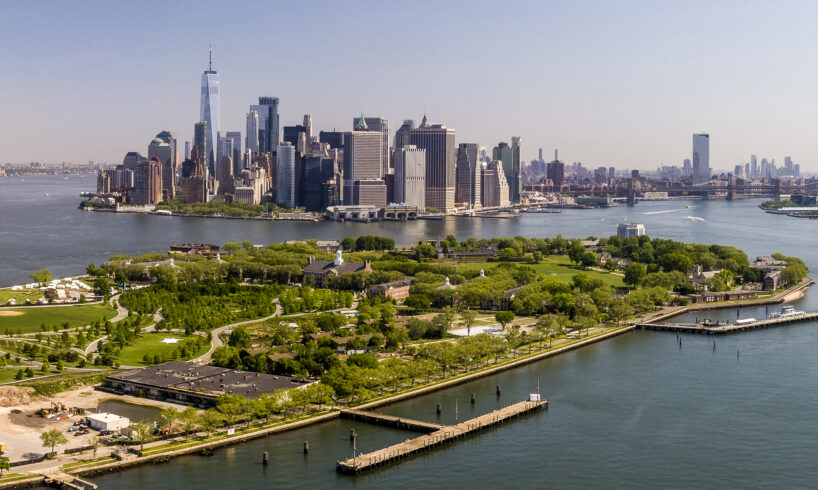
Governors Island has its top four for a new climate hub.
Four university-led teams are in the final stretch to win the right to build a new center for climate change and resiliency research on the 172-acre island, with proposals calling for everything from a “living lab” to deep-sea explorations.
The finalists for the project are teams from the Massachusetts Institute of Technology, Northeastern University, Stony Brook University, and a group co-led by CUNY and The New School. The mayor and the Trust for Governors Island announced the top contenders Wednesday.
“We are feeling, as one of the world’s great coastal cities, the impact of climate change,” Mayor Bill de Blasio said as he announced the finalists from City Hall. “We are the place that has the talent, the drive, the energy to create the climate solutions of the future.”
The four were chosen from a long list of academic institutions and real estate developers interested in the project. The city had opened up submissions this summer.
Each of the four final groups will submit a more detailed application through a process that will begin in the spring of 2022, the trust said.
“These four proposals showcase ambitious and innovative approaches that underscore the urgency of addressing challenges posed by climate change,” said Clare Newman, president and CEO of the Governors Island Trust.
Eight other proposals previously reported on by THE CITY will not move forward, including one by a 15-university consortium named Renewable Nations L3C and another by former deputy mayor Dan Doctoroff.
All four final groups envision roughly similar complexes: a mix of educational, research and conference space to tackle the biggest challenges of climate change — in the middle of New York Harbor.
Climate Retreat
The location is a big draw for Kevin Reed, associate dean for research at Stony Brook’s School of Marine and Atmospheric Science, or SoMAS, who helped plan the Suffolk County state school’s proposal.
“It’s an opportunity to actually have a retreat-style hub within the center of the biggest city in the United States,” he said.
He described Stony Brook’s idea for the 33-acre parcel on the 172-acre island as a “living lab that convenes the top minds in climate change.” The university plans to incorporate research, education and workforce training in a campus-like atmosphere featuring dormitories, faculty housing and a hotel, with space for research, classrooms and conferences.
“It’s a hub of activity, meaning that people will come to the island maybe for a semester, or for a one-week conference, or for a two-week or two-year research or incubator project,” he said.
The Governors Island Trust has set aside the southeastern corner of the island for development of the new climate center, close to the current Brooklyn-bound ferry dock.
With the environmental work Stony Brook already does via SoMAS, Reed believes his team is well-positioned to take on the project.
From the Depths to The Heights
The other applicants made that case, too. Through its Environmental Solutions Initiative, MIT wants to bring a “solutions and innovation center” to the island with a focus on the “rapid commercialization and deployment of climate solutions,” a statement from the Trust said.
The most local team, CUNY and The New School going under the name C3: Climate Center Consortium, submitted a proposal that mixes academic, research and community organizations to merge “the work of climate adaptation, mitigation, and environmental justice,” the release said.
The project aims to combined CUNY’s “vast climate research, education and workforce development programs” and The New School’s “world-renowned design capacity, strong social science scholarship, and applied solutions-based scholarship,” CUNY Chancellor Félix V. Matos Rodríguez and New School President Dwight A. McBride wrote in a joint statement to THE CITY.
Northeastern “put together a team that would be able to reach from the poles of the earth to the deep ocean, to the littorals, into the harbor and on into urban neighborhoods,” said David Luzzi, senior vice provost for research at the university.
That includes members from the Woods Hole Oceanographic Institution in Massachusetts, the University of Tokyo and the University of Puerto Rico at Mayagüez.
The group wants to create a destination study and work location for students, a draw for the public to learn about climate change mitigation and a place to create “special experimental facilities” to draw researchers from all over the world, Luzzi said.
‘Unique Facilities’
What might that look like? He couldn’t say because the proposal is “proprietary.” But, for example, he noted, at Northeastern’s Burlington, Mass., campus, the school built a huge “Faraday cage” to allow experimental study of telecommunications and has the world’s largest supercomputer for analyzing wireless networks.
“We have built unique facilities not available elsewhere in the world, or in the country,” Luzzi said. “With Governors Island, we see the real opportunity to do that.”
Amy Chester, managing director of the resiliency planning group Rebuild By Design, said she’s glad to see “home-grown and nearby talent” recognized.
All four teams will likely have a deeper understanding of East Coast-specific climate risks, she added.
“We look forward to seeing their vision of transforming an island vulnerable to sea level rise, increased storm surge and heavy rain to one that teaches about climate change,” she said.
The city and trust have promised $150 million toward the winning project. The total cost to create the new climate hub, however, will likely be much more — Cornell University’s 12-acre campus on Roosevelt Island, for instance, cost $2 billion — and whichever proposal wins is financially responsible for new facilities and programs, the trust said.
The final project winner will likely be chosen by the trust by the end of 2022, the groups said.
De Blasio announced the Governors Island finalists on Wednesday as part of a number of climate change-related measures, including signing the City Council’s bill banning gas in city buildings.
This article was originally posted on Four Finalists Chosen for Climate-Change Hub on Governors Island